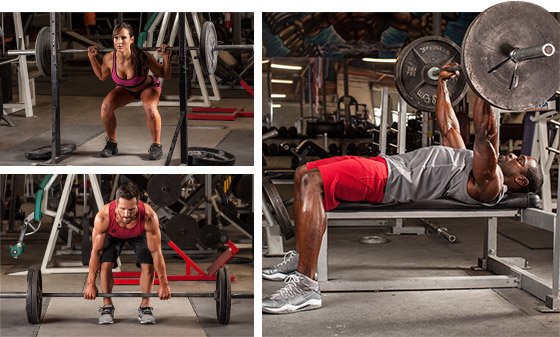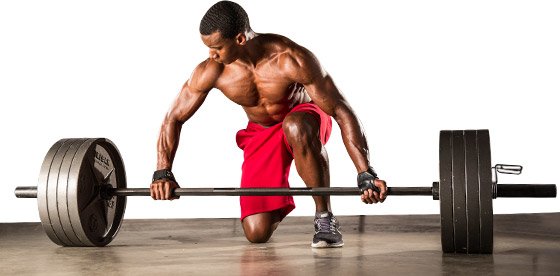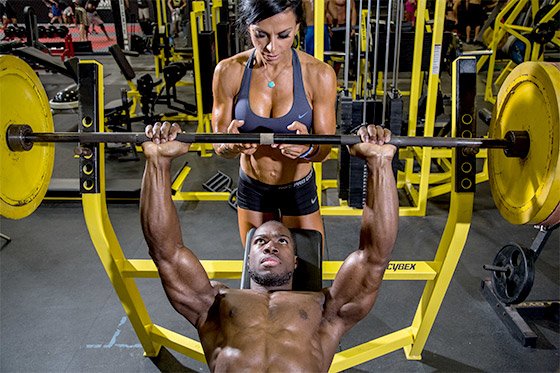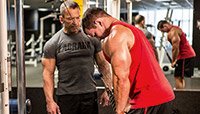Have you ever gotten home after a workout feeling like you didn't even do anything at the gym? Well, that's probably because you didn't. Sure, you lifted some weights for about an hour and a half and tried all the new exercises from your favorite fitness magazines. But the question is, how much of that hour and a half did you actually spend being efficient and doing things that give you results?
The short list below will be golden to most and might just act as a reminder to some. You may be familiar with some of these. Either way, you should read it, absorb it, and apply it. Follow these simple tips and you'll get more out of your workouts than ever before.
1
Ramp Up The Intensity
Whatever their goal might be, people always ask me which workout routine is best. My response every single time: It doesn't exist.
There's no one "best routine." No matter how they look on paper, you can make any workout either really good or really bad depending on the intensity you apply.
Some tips: lift heavy, shorten rest periods, keep your workouts to an hour or less, cut back on socialization or eliminate it altogether, and strive to break new personal records every week. If you don't look like you're in any discomfort (keyword "discomfort," not "pain"), then you're not working out at all.
2
Perform Heavy Compound Exercises
The majority of your workouts should include compound movements such as squats, deadlifts, rows, presses, chin-ups, and pull-ups. There's nothing wrong with isolation exercises like dumbbell curls, but they're an accent to bigger moves. Build a good foundation with your strength and physique first, and then incorporate isolation exercises.
In addition to performing compound exercises, lift with relatively heavy weights to stimulate muscle growth. Focus on heavy compound exercises will allow you to see better results in less time.

3
Practice Proper Form Instead Of Heavy Weight
Remember, lifting heavy isn't everything. Whether your goal is fat loss or muscle gain, proper form is essential for success. Not only does it help to stimulate muscle growth, but performing exercises with proper form also ensures that your body stays healthy. The last thing you want is an injury. Take the time to learn proper form and technique for all the exercises you want to do in the gym.
Always be aware of the mind-muscle connection when doing a movement. Although lifting heavy weights stimulates muscle growth, it only does so if the muscles are under constant tension. Control the weight—don't let it control you.
4
Commit To Mental Strength
Mental toughness is just as important as physical toughness. Your strength isn't defined by how much muscle you have or how much weight you can lift. It's defined by how well you can manage your emotions.
Imagine getting ready to do your last set of deadlifts. You're attempting a new one-rep max. You step toward the bar, but your mind starts messing with you, telling you that you won't be able to complete the lift because the weight is too heavy. The moment this thought starts to take over, the game is over. Even before you try, you've failed.
Always have the right mindset. Always stay focused. Visualize what you want out of every set, and don't let self-doubt get the best of you.

5
Incorporate Bodyweight Exercises
Bodyweight exercises like push-ups, pull-ups, chin-ups, and dips belong in your training routine. Yep, it's that simple.
These exercises aren't just for beginners. If they're too easy for you, do other variations that give you more of a challenge. If you can do push-ups with ease, then try doing decline push-ups. If you can do pull-ups for reps, then try doing archer pull-ups . These compound movements help build strength and size like no other.
6
Avoid Working Out In Groups
If you don't like training by yourself, it's perfectly fine to have a workout buddy. Some people train better with someone else because it allows them a challenge throughout the workout. Training with a group, however, can be a different story. There's a higher chance that you'll be socializing more than you're lifting. Group training sometimes backfires.
Train with only one other person, if needed.

7
Listen To Music
Listening to music will help you stay focused during your workouts. Research has suggested that listening to music while working out can make physical exertion less exhausting while helping you set a better pace.
Just make sure that you make your workout playlist at home so you don't waste any time looking for songs to listen to during your lifting session. As an added bonus, wearing headphones will deter people from talking to you—at least 90 percent of the time.
8
Log Your Workouts
Writing down your numbers allows to know (and remember) where you stand so you know what you have to aim for next time. Always try to improve on your lifts—whether that means adding more weight or increasing the number of reps. That's what "progressive overload" means. You increase the demands on your musculoskeletal system enough that you continually make gains in muscle size, strength, and endurance.
Not much for pen and paper? Try plugging your numbers into a workout tracker like BodySpace.
Recommended For You

10 Ways To Fast Track Your Transformation
You're looking to transform, not evolve. You have time, but not forever. Follow these 10 tips and speed up your progress. Let's go!
5 Techniques To Turbo-Charge Your Muscle Growth
You can't beat the classic movements when the goal is building a strong, balanced physique, but you can make them even more effective with these five tried-and-true overload techniques!

